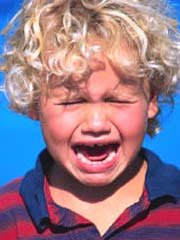
Dear Dr. Hurd:
I know that you focus on present issues, not childhood issues. But sometimes childhood issues are alive and ‘well’ in the present. Let me give you a couple of examples.
Ever since I was very young (my parents say about 5 years old), I would get upset very easily if something didn’t work out as I liked. For example, if a toy broke, I would be very upset, and would not care to fix the problem (replace the toy). It was an attitude I had of, “why did this have to happen to me”. Also, I would deny the initial value of the toy altogether by saying that I didn’t like it anyway, even though I did.
For several years after that, I recall instances when I really wanted something, either from a parent or someone else. As soon as someone made the slightest objection, or as soon as I found out that there was something wrong with what I wanted, I would immediately deny wanting it anymore, even though the value of the thing outweighed all else.
I bring these examples up because I find myself feeling the same things in the here and now. It’s like I never got over those old feelings back from childhood. Would you address those with a client, and if so how? Do you have any input or advice for me?
Dr. Hurd replies:
Do you have a subconscious core evaluation—held emotionally—which suggests that the law of cause and effect is being applied to you personally (as if by an invisible hand) rather than simply being the law of cause and effect? As an adult, you know better. But on the emotional level you might sometimes be reacting as if the perception you had at age 5 were true: ‘This is happening because someone or something is out to get me—or because things are just not destined to go my way.’
To get past this (or other) actual or possible core evaluations, it’s necessary to do two things. One, identify on a conscious level any fallacies you see in the emotional reaction. Doing this will help make it less potent. A good therapist will help you do this in counseling sessions, but you will also need to ‘run with it’ and think it through on your own, as well.
Second, develop strategies for countering the mistaken core evaluation. (Developing strategies is easier to do once you have consciously identified all the errors in the core evaluation). For example, you might develop a strategy like this, when you feel that ‘things are happening to me.’ You might say to yourself: ‘Reality simply is. It’s neither for me nor against me. Things happen that are not under my control, and yet I do have control over a lot of things that happen in my life. In all cases, the laws of cause and effect are in place. These laws are neither fair nor unfair. Only a volitional human being can be fair or unfair—a law of nature or reality cannot.’
These are just some ideas to get you started, and are not intended to be a substitute for your own work on identifying as many errors as you can in the core evaluation.
Additionally, here are some mistaken premises that I detect in these childhood reactions that you described:
1) ‘Others can determine what’s right for me to want or not want.’ (False premise—only YOU can determine this, with the aid of facts and logic. Others whom you respect can play a role in helping you decide, but only using facts and logic. And you evaluate their use of facts and logic for accuracy).
2) ‘I should conceal what I really want because it’s wrong, at least when others object to it.’ (False premise of above, plus an additional false idea that shame is warranted when you’re disapproved of or different. Shame is never warranted, except—in a very temporary sense—when you KNOW you did something wrong, you know why it’s wrong, and you have used your own logic and understanding of facts to determine this.)
This is just a start. This one article will not fix everything. But hopefully it gives you a framework.
The thing to understand about childhood is that certain core evaluations or convictions — in emotional form — are shaped during that time. Those assumptions can spill out in the present, in adult versions of equivalent situations from childhood. The important thing to do in the present is understand this is happening, and identify ways — with professional help, when needed — of reprogramming your mind to respond in different, more adult or more rational ways. That’s a key part of what good therapy does.
Be sure to “friend” Dr. Hurd on Facebook. Search under “Michael Hurd” (Rehoboth Beach DE). Get up-to-the-minute postings, recommended articles and links, and engage in back-and-forth discussion with Dr. Hurd on topics of interest.
